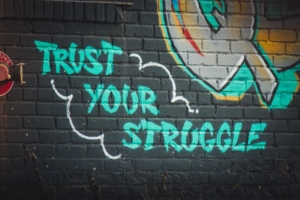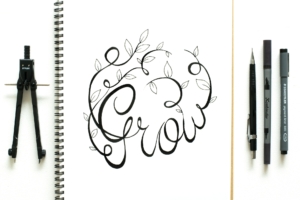Viktor Frankl (1905-1997), the Austrian neurologist and psychiatrist, represents the epitome of overcoming tragedy and making it meaningful. A Holocaust survivor imprisoned in the infamous concentration camp Auschwitz, Frankl lost nearly all of his family save one sister to genocide, including his unborn child.
 How do you make sense of that or find meaning in the loss? How do you keep going when all you knew, loved, and believed in is gone, and living in the world feels like a nightmare from which you can’t wake?
How do you make sense of that or find meaning in the loss? How do you keep going when all you knew, loved, and believed in is gone, and living in the world feels like a nightmare from which you can’t wake?
Frankl made it his life’s work to find purpose in this struggle we call life. He called this treatment approach logotherapy, which in Greek means “healing through meaning.” How do we make life meaningful? Frankl put it his way in his book “Man’s Search for Meaning” (1959):
Life is potentially meaningful under any conditions, even those which are most miserable. And this in turn presupposes the human capacity to creatively turn life’s negative aspects into something positive or constructive. In other words, what matters is to make the best of any given situation.
Making sense of life’s experiences can be daunting: the loss of a job or career; a marriage ending in divorce; an accident resulting in permanent physical handicap and/or cognitive impairment; the abuse and/or death of a child; the death of a loved one from an accident, negligence, or suicide; estrangement from a family member; terminal illness; the list goes on and on.
Everyone’s pain is valid, no matter the severity in comparison to someone else’s. You can’t change what happened. You can only find the proverbial silver lining or continue in your misery. It’s about the reframe, the acceptance, the pivot, the reflection.
If you believe that the goal of life is to be free of trials, you sit in a sea of disappointment. We are always going into a crisis, going through a crisis, or coming out of a crisis. There is no way around that. We read in the Book of Psalms about this cycle of sadness and joy.
For his anger lasts only a moment, but his favor lasts a lifetime; weeping may stay for the night, but rejoicing comes in the morning. – Psalm 30:5, NIV
 You continue to cause your suffering when you resist pain. Letting go is to allow life…to accept what is, not to resist the inevitable, which is that there will always be discomfort; so you can fight it, but you will create more suffering. Acceptance allows all the emotions to flow through you rather than stay stuck within you thereby causing more suffering. Put simply: suffering = pain * resistance.
You continue to cause your suffering when you resist pain. Letting go is to allow life…to accept what is, not to resist the inevitable, which is that there will always be discomfort; so you can fight it, but you will create more suffering. Acceptance allows all the emotions to flow through you rather than stay stuck within you thereby causing more suffering. Put simply: suffering = pain * resistance.
Of the thousands of client hours I have sat through, I have noticed a pattern: the ones who recognize that refining only comes through fire are the ones who are the most joyful. Often, they ask why bad things happen to good people, to children, or to themselves.
I respond that I don’t have an answer, but that I do know those things are never avoidable, so they have a choice: either to continue to ruminate on the tragedy, wish it away, or acknowledge the pain and somehow use the struggle as a means of self-growth.
We are always learning; when we stop, we give up on hope, on life, on ever achieving joy. When we resist the inevitable, change and turmoil, and discomfort, we deny ourselves the beauty of the opportunity to transform.
Another question I get is where is God in all this chaos and tragedy, pain and loss? He is with us, fighting the enemy, Satan, who comes to steal, kill, and destroy, not just physically, but to take away our joy! It is easy to let Satan win because evil is pervasive, its tentacles far-reaching; it takes intention and perseverance to overcome.
If we focus on the negative, we will always find it. What you focus on is what will become the manager of your thoughts and feelings. What goes in must come out. For example, if you listen to gossip, you will internalize and project the content, usually encompassing judgment, negativity, and victimhood.
If you listen to the news, which often does not highlight human acts of kindness and good deeds, altruism, and benevolence, you might find yourself more aware of what is going on in the world, which isn’t necessarily bad, but you may also become more fearful and hopeless.
Why do we focus on the horrific states of affairs in our world? Because people love drama and conflict, and Satan loves to get us to look at what we don’t have control of rather than the strength within us through Christ.
I can do all things through Christ who strengthens me. – Philippians 4:13, NKJV
 One of my clients told me once that the most powerful thing he took from our sessions up to that day was when I said to him as he was leaving, “You got this.” He told me that he often heard those words in my voice (clients often experience this and you hope it was something profound!) when he was struggling in the moment and that it would encourage him and get him through that crisis.
One of my clients told me once that the most powerful thing he took from our sessions up to that day was when I said to him as he was leaving, “You got this.” He told me that he often heard those words in my voice (clients often experience this and you hope it was something profound!) when he was struggling in the moment and that it would encourage him and get him through that crisis.
You see, the words we speak to others and ourselves, in our heads or out loud, can create the bridge from sadness to joy, be the lifeline from despair to hope. We see this in Proverbs 18:21 (NJKV): “Death and life are in the power of the tongue.” In a nutshell, your response to and recovery from any situation is predicated on what you feed your mind and soul.
As a practicum student, I worked with patients who suffered a Traumatic Brain Injury (TBI), usually from a stroke, but sometimes from an accident, such as a car crash, which resulted in injury to the brain and typically yielded some paralysis and/or cognitive impairment. What I noticed is that those patients who had faith in God were the ones who healed more quickly.
In addition, those who focused on what they could control (themselves and their reaction to the situation), and what they could do despite their limitations in the moment, fared much better. They embraced their strength, bridled their thoughts to focus on the positive, and leaned into something bigger than themselves.
That determination to use the experience as a challenge rather than a white flag is powerful. That reframe from victim to victor, from suffering to self-growth, created in them an exponential shift.
A young couple I knew years ago lost their two-year-old child to a self-inflicted gunshot wound when he was playing cops and robbers with his mommy’s just-cleaned pistol set down within his reach on the countertop. It was a horrible accident. I don’t think you ever get over that kind of trauma, but you can’t wish it away, so you have to use it for good in some way, shape, or form.
 The family made it their life’s work to educate and promote gun safety awareness. The dad, a police officer, suffered PTSD from holding his child’s lifeless body in his arms and eventually had to resign. He found God in the aftermath and baptized his son.
The family made it their life’s work to educate and promote gun safety awareness. The dad, a police officer, suffered PTSD from holding his child’s lifeless body in his arms and eventually had to resign. He found God in the aftermath and baptized his son.
Nick Vujicic is a Christian motivational speaker/evangelist who was born limbless, abandoned by his parents in the hospital, and later bullied at school. He took his physical limitations and embraced the life he had to teach others that it is not about what you have (or don’t have) but how you use it.
You can see his numerous book publications and videos on his website www.NickVujicic.com. He coined such sayings as “Obstacles = Opportunities” and “No Arms, No Legs, No worries.” I used his videos as motivators for my TBI patients as a way to say, “You can overcome anything.”
Without pain, there can be no true happiness. Without darkness, no light. No good without bad. The dichotomy of existence. Embrace that concept and you welcome the struggle because you know that to reap a reward; you just endure the crisis.
In my own life, after the death of my mother from cancer when I was twenty-three years old and she was forty-six, I questioned God and the reason for living at all. My life has become about holding others in their pain and teaching them to reframe tragedy and loss. In my memoir, “The Suicidal Christian: A Journey in Redefining Faith and Life” (2022), I outline how I made each trauma, from childhood to the present, meaningful.
You always have a choice in how you react to any situation. Will you choose to sit in it and give up or gain wisdom from the experience and make it meaningful? Reach out to one of our therapists to help you navigate the shift from struggle to self-growth.
“Trust Your Struggle”, Courtesy of DJ Johnson, Unsplash.com, CC0 License; “Grow”, Courtesy of LUM3N, Unsplash.com, CC0 License; “Rock Climber”, Courtesy of NEOM, Unsplash.com, CC0 License; “Footbridge”, Courtesy of Tasha Marie, Unsplash.com, Unsplash+ License










